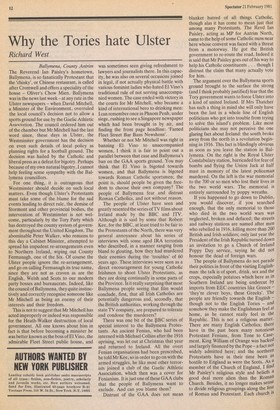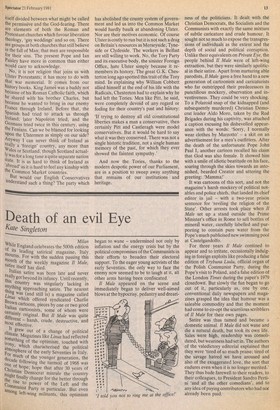Why the Tories hate Ulster
Richard West
Ballymena, County Antrim The Reverend Ian Paisley's hometown, Ballymena, is so fanatically Protestant that the `chinky', or Chinese restaurant, is called after Cromwell and offers a speciality of the house — Oliver's Chow Mien. Ballymena was in the news last week — at any rate in the Ulster newspapers — when David Mitchell, a Minister of the Environment, overruled the local council's decision not to allow a sports ground for use by the Gaelic Athletic Association. The council ordered him out of the chamber but Mr Mitchell had the last word since, these days in Ulster, the Westminster government has the decision on even such details of local policy as planning rights for a football ground. The decision was hailed by the Catholic and liberal press as a defeat for bigotry. Perhaps because of my own natural bigotry, I cannot help feeling some sympathy with the Ballymena councillors.
For one thing, it is outrageous that Westminster should decide on such local matters. Even though Ulster's Protestants must take some of the blame for the sad events leading to direct rule, the demise of Stormont and other provincial bodies, the intervention of Westminster is not welcome, particularly by the Tory Party which has destroyed the county system of government throughout the United Kingdom. The abominable Peter Walker, who remains to this day a Cabinet Minister, attempted to spread his impudent re-arrangements even to Northern Ireland, wiping out County Fermanagh, one of the Six. Of course the Ulster people ignore the re-arrangement, and go on calling Fermanagh its true name, since they are not as craven as are the English, Welsh and Scots to our modern party bosses and bureaucrats. Indeed, like the council of Ballymena, they quite instinctively and correctly recognise someone like Mr Mitchell as being an enemy of their interests and their freedom.
This is not to suggest that Mr Mitchell has acted improperly or indeed was responsible for the Heath-Walker destruction of local government. All one knows about him in fact is that before becoming a minister he was better known as the boss of El Vino, the admirable Fleet Street public house, and was sometimes seen giving refreshment to lawyers and journalists there. In this capacity, he was also on several occasions joined in legal, if not actually physical battle with various feminist ladies who hated El Vino's traditional rule of not serving unaccompanied women. The case ended with victory in the courts for Mr Mitchell, who became a kind of international hero to drinking men: I can remember once in Phnom Penh, under siege, rushing to see a Singapore newspaper which had been brought in by air, and finding the front page headline: 'Famed Fleet Street Bar Bans Newshens'.
Whether or not Mr Mitchell was right in banning El Vino to unaccompanied women, I think it is fair to point out a parallel between that case and Ballymena's ban on the GAA sports ground. You may think that El Vino is bigoted towards women, and that Ballymena is bigoted towards Roman Catholic sportsmen; the point is, should people be given the freedom to choose their own company? The people of Ballymena fear and distrust Roman Catholics, and not without reason.
The people of Ulster have seen and greatly resented the series of TV films about Ireland made by the BBC and ITV. Although it is said by some that Robert Kee, for the BBC, at least tried to be fair to the Protestants of the North, there was very general annoyance about his series of interviews with some aged IRA terrorists who described, in a manner ranging from bland to gloating, how they had murdered their enemies during the 'troubles' of 60 years ago. These interviews were seen as a direct encouragement for young Catholic Irishmen to shoot Ulster Protestants, as they are doing continually in some parts of the Province. Is it really surprising that most Ballymena people seeing that film would conclude, first, that all Irish Catholics are potentially dangerous and, secondly, that the British authorities, working through the state TV company, are prepared to tolerate and condone the murderers?
There was one bit of the 13BC series of special interest to the Ballymena Protestants. An ancient Fenian, who had been interned with Michael Collins after the 1916 uprising, was let out at Christmas that year and returned to Ireland. All the overt Fenian organisations had been proscribed, he told Mr Kee, so in order to go on with the armed struggles, he like most other terrorists joined a club of the Gaelic Athletic Association, which then was a cover for Fenianism. It is just one of these GAA clubs that the people of Ballymena want to exclude. And can you blame them?
Distrust of the GAA does not mean blanket hatred of all things Catholic, though alas it has come to mean just that among many Protestants. The Revd Ian Paisley, acting as MP for Antrim North, came to the help of some Catholic nuns near here whose convent was faced with a threat from a motorway. He got the British government to re-route the road. Indeed it is said that Mr Paisley goes out of his way to help his Catholic constituents. . . though I distrust the claim that many actually vote for him.
The argument over the Ballymena sports ground brought to the surface the strong (and I think probably justified) fear that the Tory government wants to force Ulster into a kind of united Ireland. If Mrs Thatcher has such a thing in mind she will only have been the last in a whole line of English politicians who got into trouble from trying to solve this island's problem. Like most politicians she may not perceive the one glaring fact about Ireland: the south broke away from the north in a revolution beginning in 1916. This fact is blindingly obvious as soon as you leave the station in Ballymena. On the right is the Royal Ulster Constabulary station, barricaded for fear of bombs and flying the Union Jack at half mast in memory of the latest policeman murdered. On the left is the war memorial to the 700 or so men who lost their lives in the two world wars. The memorial is entirely surrounded by poppy wreaths.
If you happened to go down to Dublin, you would discover, if you searched enough, that the only memorial to those who died in the two world wars was neglected, broken and defaced; the streets and railway stations are named after men who rebelled in 1916, killing more than 200 British and Irish soldiers; only last year the President of the Irish Republic turned down an invitation to go a Church of Ireland Poppy Day service, saying he did not honour the dead of foreign wars.
The people of Ballymena do not parade their politics in front of the visiting Englishman: the talk is of sport, drink, sex and the crops, especially potatoes which here as in Southern Ireland are being undercut by imports from EEC countries like Greece — 'they're clever boys, these Greeks'. The people are friendly towards the English — though not to the English Tories — and somehow they make the Englishman feel at home, as he cannot really feel in the Republic. This is not a religious matter. There are many English Catholics; there have in the past been many notorious Protestant Fenians, from Tone to Casement. King William of Orange was backed and largely financed by the Pope — a fact not widely admitted here; and the northern Protestants have in their time been as hostile to England as were the Scots. As a member of the Church of England, I find Mr Paisley's religious style and beliefs a good deal more alien than the Roman Church. Besides, it no longer makes sense to divide religious groupings along the line of Roman and Protestant. Each church IS itself divided between what might be called the permissive and the God-fearing. There are elements of both the Roman and Protestant churches which favour liberation theology, 'gay weddings' and so on. There are groups in both churches that still believe In the fall of Man; that men are responsible for their sins. The present Pope and Ian Paisley have more in common than either would care to acknowledge. No, it is not religion that joins us with Ulster Protestants; it has more to do with that war memorial. It comes from our history books, King Jame‘g was a baddy not because of his Roman Catholic faith, which he shared with his brother Charles, but because he wanted to bring in our enemy France through Ireland. Before that, the Spanish had tried to attack us through Ireland; later Napoleon tried; and the Germans tried twice in this century, using the Fenians. Can we be blamed for looking Upon the Ulstermen as simply on our side? Anyway I can never think of Ireland as really a 'foreign' country, any more than Wales or Scotland, though Scotland actually was for a long time a quite separate nation state. It is as hard to think of Ireland as abroad' as it is hard to feel any kinship with the Common Market countries.
But would our English Conservatives understand such a thing? The party which has abolished the county system of government and led us into the Common Market would hardly baulk at abandoning Ulster. Nor are their motives economic. Of course Ulster is costly to run but it is not such a drag on Britain's resources as Merseyside, Tyneside or Clydeside. The workers in Belfast are still willing to work. No, the Tory Party and its executive body, the sinister Foreign Office, hate Ulster simply because it remembers its history. The great G.K. Chesterton long ago spotted this trait of the Tory mind, In explaining why William Cobbett allied himself at the end of his life with the Radicals, Chesterton had to explain why he had left the Tories. Men like Pitt, he said, were completely devoid of any regard or feeling for their country's past and history: 'If trying to destroy all old constitutional liberties makes a man a conservative, then certainly Pitt and Castleragh were model conservatives. But it would be hard to say what it was they conserved. There was not a single historic tradition, not a single human memory of the past, for which they ever showed the faintest sympathy.'
And now the Tories, thanks to the modern despotic power of our Parliament, are in a position to sweep away anything that remains of our institutions and heritage.







































 Previous page
Previous page